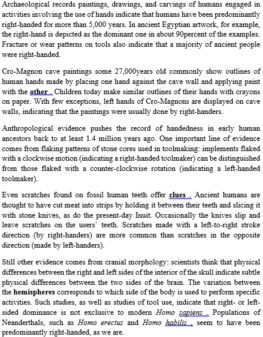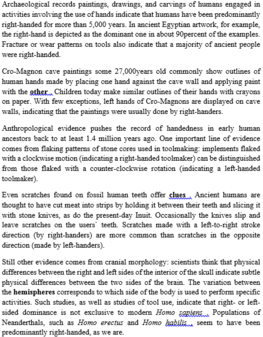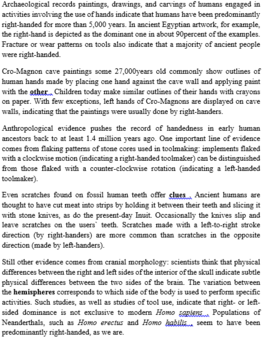Read the following passage and mark the letter A, B, C, or D on your answer sheet to indicate the correct answer to each of the questions from 36 to 42.
The countryside of Britain is well known for its beauty and many contrasts: it bare mountains and moorland, its lakes, rivers and woods, and its long, often wild coastline. Many of the most beautiful areas are national parks and are protected from development. When Britain people think of the countryside they think of farmland, as well as open spaces. They imagined cows or sheep in greenfield enclosed by hedges or stone walls and field of wheat and barley. Most farmland is privately owned but is crossed by a network of public footpaths.
Many people associate the countryside with peace and relaxation. They spend their free time walking or cycling there, or go to the country for a picnic or a pub lunch. In summer people go to fruit farms and pick strawberries and other fruit. Only a few people who live in the country work on farms. Many commute to work in towns. Many others dream of living in the country, where they believe they would have a better and healthier lifestyle.
The countryside faces many threats. Some are associated with modern farming practices, and the use of chemical harmful to plants and wildlife. Land is also needed for new houses. The green belt, an area of land around many cities, is under increasing pressure. Plans to build new roads are strongly opposed by organizations trying to protect the countryside. Protesters set up camps to prevent, or at least delay the building work.
America has many areas of wild and beautiful scenery, and there are many areas, especially in the West in States like Montana and Wyoming, where few people living. In the New England states, such as Vermont and New Hampshire, it is common to see small farm surrounded by hills and green areas. In Ohio, Indianan, Illinoisan and other Midwestern states, field of corns or wheat reach to the horizon and there are many miles between towns.
Only about 20% of Americans live outside cities and towns. Life may be difficult for people who live in the country. Services like hospitals and schools may be further away and going shopping can mean driving long distances. Some people even have to drive from their homes to the main road where their mail is left in a box. In spite of the disadvantages, many people who live in the country say that they like the safe, clean, attractive environment. But their children often move to a town or city as soon as they can
According to the passage, some Americans choose to live in country because______
A. Life there may be easier for them
B. Hospitals, schools, shops are conveniently located there
C. Their children enjoyed country life
D. They enjoy the safe, clean, attractive environment there






Đáp án D
Dựa theo đoạn văm, một vài người Mỹ chọn sống ở nông thôn vì _______
A. Cuộc sống ở đây có lẽ sẽ dễ dàng hơn với học
B. Bệnh viện, trường học, cửa hàng đều ở đó, rất thuận tiện
C. Con em của họ thích cuộc sống ở nông thôn
D. Họ thích môi trường an toàn, sạch sẽ và thu hút ở đây
Giải thích: “In spite of the disadvantages, many people who live in the country say that they like the safe, clean, attractive environment” (Mặc dù sự bất lợi, nhiều người sống ở vùng quê nói rằng họ giống an toàn, sạch, môi trường hấp dẫn)